Former Iranian President Speaks Against Regime Change
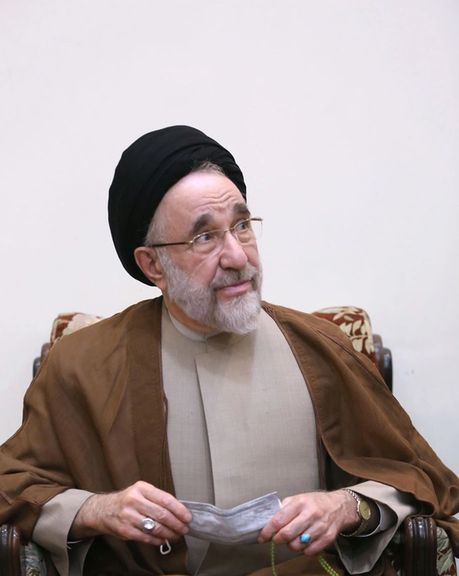
Amid ongoing antigovernment protests, former president and the de-facto leader of Iran’s reformists Mohammad Khatami has spoken against regime change, calling it neither possible nor desirable.

Amid ongoing antigovernment protests, former president and the de-facto leader of Iran’s reformists Mohammad Khatami has spoken against regime change, calling it neither possible nor desirable.
In a message on Monday, the Khatami noted, however, that if the current state of affairs continues, the ground is paved for a looming social collapse.
Expressing regret over the death of "tens of people, many of whom are children and adolescents,” he said the root cause of these “bitter events” is from inside the country, rejecting the official line of Islamic Republic’s propaganda that blames other countries for fomenting the protests.
The current situation is the result of a faulty and incorrect governance mechanism, Khatami noted.
He debunked another claim by the clerical regime that seeks to portray the current wave of protests ignited by the death in custody of Mahsa Amini as fueled by ethnic or religious rivalries and aimed at the balkanization of Iran. “Although the protests started with the unfortunate death of Mahsa Amini (a Kurd), they did not take on an ethnic or religious tone and no separatist voice was heard from it,” he said.
“Ignoring or denying the bad situation that is imposed on people…does not eliminate dissatisfaction,” Khatami said. Misrepresenting the protests as “riots” to justify a harsh response only aggravates the problem, he added.
Earlier in the month, both supporters and opponents criticized Iran’s embattled Reform Front for a statement it issued presenting a double-edged position over current protests.
In October, the spokesman for Iran’s Reform Front, Abolfazl Shakouri-Rad, said a bipolar situation has taken shape in Iranian politics and reformists have been left out of the political debate by both the hardline government and the protesters who do not want an Islamic government.
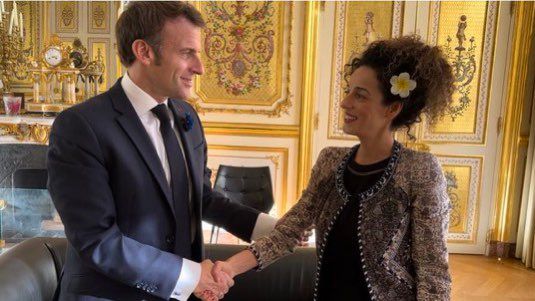
President Emmanuel Macron said Monday that reviving the 2015 Iran nuclear deal was unlikely and that a regional conference should be called by year end.
France has long supported the 2015 agreement, the JCPOA (Joint Comprehensive Plan of Action) as a step towards regional agreements over other issues, including defense, security, and trade. But speaking to France Inter radio Monday, Macron said he hoped to establish a “new framework” involving regional powers, including Iran, that was probably now needed, and that he was “very cautious” over prospects for restoring the JCPOA.
Macron suggested current unrest in Iran, which he characterized Saturday as a “revolution,” had “fragilized” the 2015 agreement, which the United States left in 2018, leading Iran after 2019 to expand its nuclear program beyond JCPOA limits.
The French president was criticized Sunday by Iran’s foreign affairs spokesman for meeting with overseas Iranian opposition activists, including US-based Masih Alinejad, who is prominent in social media and more recently on US and other media networks.
Nasser Kanaani called Macron’s comments after the meeting – which encouraged Alinejad to praise France as “the first country to officially recognize this revolution” – “a flagrant violation of France’s international responsibilities in the fight against terrorism and violence.”
Iran has been presenting the protests as "riots" and some protesters as "terrorists". It has already sentenced one protester to death for allegedly attacking a government building.
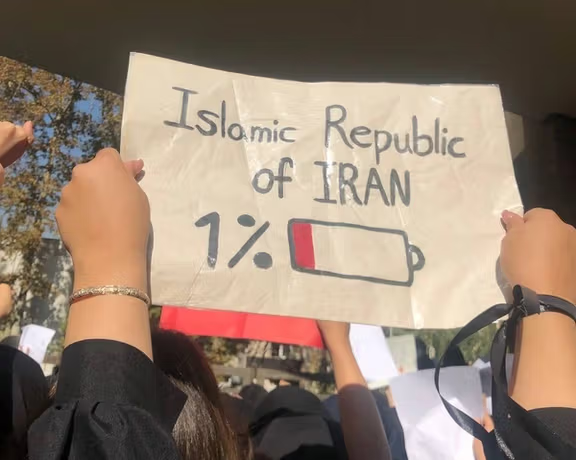
Although around 40 security forces have been killed during protests since September, more than 330 demonstrators have died mostly by bullets of regime’s official and unofficial gunmen.
While the logic of the JCPOA separated Iran’s nuclear program from other issues, the distinction has become harder to maintain given international publicity of protests following the September 16 death of a 22-year-old woman in the custody of Tehran ‘morality police.’
So far, the US and three European JCPOA signatories – France, Germany and the United Kingdom – have said they are committed to reviving the agreement, and that the failure of 18-month talks is due solely to Iran making demands beyond the original agreement. Meetings are due in Tehran later this month as International Atomic Energy Agency seeks what it deems satisfactory answers over uranium traces found in sites linked to Iran’s pre-2003 nuclear work. Iranian officials, including President Ebrahim Raisi, have said the IAEA probe into the matter should be dropped in order to revive the JCPOA.
Dim prospects?
Prospects for a regional conference – Macron’s proposed ‘new framework’ – appear dim, and the French president did not specify who should be involved. Multilateral efforts to end the war in Yemen, or the violent fragmentation of Syria, have floundered.
Iran and Saudi Arabia, despite Iraq-brokered talks, have not restored diplomatic relations broken off 2016 after Riyadh executed leading Shia cleric Nimr al-Nimr, and most Arab states hold the Arab League position that Israel should not be recognized until it accepts a viable Palestinian state. Russia, ostracized by the US and European Union over Ukraine, coordinates oil policy with Saudi Arabia and has military cooperation with Iran.
Macron clearly did not accept Alinejad’s view that diplomatic relations with Iran be broken off and established instead withwhat she called “the Iranian opposition.” Alinejad has also organized a petition calling for the removalof Rob Malley, the US official who has led talks aimed at JCPOA restoration.
European Union foreign ministers meeting today in Brussels are expected to impose new sanctions on Iran– with Macron telling France Inter radio he was among those pushing for measures against leading officials and the Islamic Revolutionary Guard Corps (IRGC). US spokesman Ned Price said last week that while Washington was “looking at all appropriate tools” for dealing with Iran’s “foot-dragging,” it was already “very heavily sanctioned, to say the least…”

Iran says it has taken measures to provide countries whose citizens “stirred violence” during the recent protests, with documents proving their role.
Foreign Ministry Spokesman, Nasser Kanaani said Monday that the ministry has contacted the respective countries and informed them about the role of their nationals in “riots”, without naming the countries he referred to.
“Judiciary action has been taken regarding the interventions that have caused damage in Iran and the performance of those countries whose citizens have committed crimes or have somehow played a role in connection with the riots,” added Kanaani during his weekly briefing.
He claimed that the missions of the Islamic Republic of Iran and ambassadors have informed foreign countries of the cases in the framework of diplomatic meetings.
He said in some cases the missions have also provided the corresponding governments with needed evidence, submitting letters of protest and official notes.
Iranian security forces have arrested a number of foreigners, including US, British and French citizens, for their alleged involvement in anti-government protests.
On October 20, Fars New Agency, which is affiliated with the Revolutionary Guard, said “citizens of 14 countries, including the United States, Russia, Austria, France, the United Kingdom, and Afghanistan, have been arrested in recent riots in Iran.”
Last week, the chairman of the board of Iran's Tourist Guide Association, Mohsen Haji Saeed said the Islamic Republic has arrested many foreign tourists who took photographs from the ongoing protests “out of curiosity.”

Iranian lawmakers who had asked for the execution of detained protesters seem to be backing down, by denying that they sent a letter to the hardliner Judiciary.
On November 6, IRNA News Agency reported that 227 members of the parliament asked the judiciary to deal “decisively with the inciters of the recent riots.”
“In a statement, Iranian lawmakers called for severe punishment of those who incited the recent riots urging Qisas – retaliation in kind—for moharebs,” IRNA reported.
Mohareb, which literally means warrior in Arabic, is used in Islamic law or sharia to mean ‘enemy of God’ which carries the death penalty.
“We, the representatives of this nation, ask all state officials, including the Judiciary, to treat those, who waged war [against the Islamic establishment] and attacked people’s life and property like the Daesh [ISIS], in a way that would serve as a good lesson in the shortest possible time,” state-run Press TV quoted lawmakers as saying.
The statement soon went viral, leaving in its wake a torrent of public criticism both in Iran and abroad. Germany, France and the European Union toughened their positions toward Tehran’s gross violations of human rights, threatening to sanction all the 227 lawmakers.
Abbas Abdi, a reformist politician and pundit in Tehran, slammed the letter saying in a tweet “it was not unexpected that the ones, who have entered the parliament with a low voter turnout, to call for the execution of the protesters.”
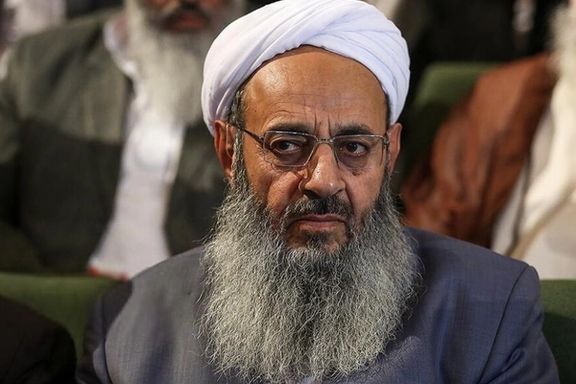
The outspoken Sunni Imam of Zahedan Friday prayer, Molavi Abdolhamid, also called the parliamentarian’s letter “shameful” asking them during his sermon on Friday, “Do other parliaments in the world act the same as you did?”
With criticisms mounting, Asr-e Iran daily said it was heard in the corridors of the parliament that “the MPs did not sign this letter.”
Finally on Saturday, ICANA News Agency, which is affiliated with Iran’s parliament, claimed the letter was “basically fake”.
“In the last few hours, a letter signed by 227 parliamentarians has been published on social media. In this letter, addressed to Chief Justice Gholam-Hossein Mohseni-Eje'i, it has been asked to classify the case of the arrested persons as Moharebeh (War against God). Let it be known that the nature of this letter is based on lies,” added ICANA.
ICANA did not address the question that if the letter was fake, why the official government news agency IRNA reported it.
Hossein Jalali, an MP, told ISNA on Sunday that “I signed a letter to deal with those who committed murder during recent events, but I heard a second letter was signed and published which is fake.”
Jalali’s remarks confirm that a letter signed by him and other lawmakers had the same content, urging judiciary to call protesters ‘mohareb’ and execute them in retaliation.
Seemingly, the strong reaction by EU politicians and their intention to sanction all the signatories of the letter have now forced them to withdraw from their previous hardline position, denying such a letter.
On Thursday, German member of European Parliament, Hannah Neumann, vehemently slammed Iranian lawmakers for demanding the execution of protesters, saying all these MPs must be sanctioned.
On the other hand, signals by officials asking to remove internet restrictions fuels speculation that the clerical regime is showing leniency amid domestic and international pressure.
Two Parliamentarians on Saturday said, “Parliament Speaker Mohammad Bagher Ghalibaf, on behalf of a large number of MPs is pursuing the removal the ban on Instagram and WhatsApp,” adopted after protests began.
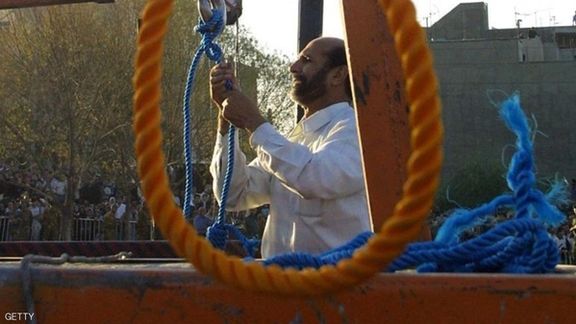
A Revolutionary Court in Iran has issued the first death penalty against a protester and another court sentenced five others from five to 10 years in jail each.
According to the Iranian Judiciary, this is only the starting point of trials for those arrested during the protests in the past two months and further trials will be held later.
The Iranian Judiciary has not named the prisoners but claimed that the young man sentenced to death had allegedly set fire to a government office building.
The verdicts have been issued by a "court of first instance" and may be changed if those convicted refer the case to a court of appeal.
No one knows when and where the trials were held or if the accused had a chance to defend themselves. In most similar cases the government does not allow defendants to choose their own lawyers and there is no due process of law.
Meanwhile, the Iranian Prosecutor General, Mohammad Jafar Montazeri has repeated claims that "the ongoing protests in Iran are being steered by the United States and other Western countries. They have deceived some of the protesters and paid some others to stop the Islamic Republic's progress."
Montazeri claimed that protesters have killed some 40 Revolutionary Guards, Basij militia and other security officers so far.
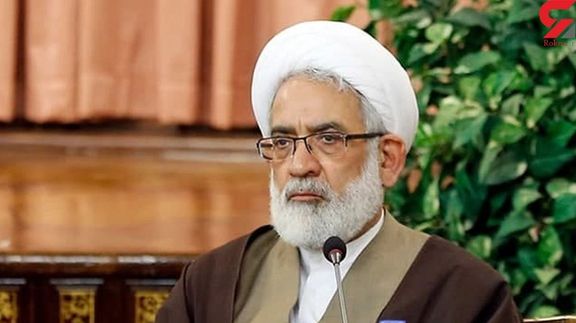
The first verdicts against Iranian protesters have been issued about a week after some 227 Iranian lawmakers called for the execution of detained protesters. However, during the past two days some of them have attempted to deny the report after extremely strong condemnations by other politicians, pundits and social media users.
Some activists on social media have threatened to fight back violently and go beyond turban-tossing as their response to executions of protesters by the hardliner Judiciary and security forces.
Prosecutor Montazeri added that although courts have been ordered to investigate the cases quickly, still trials may take longer than expected as hearing sessions need to be furthered diligently.
In the meantime, Iranian pundits advised both the government and protesters to avoid radicalism. Political activist Mansoor Haghighatpur told Nameh News website that "both left-wing and right-wing radicals in Iran have gone too far, and the Islamic Republic should get rid of both."
He added that the radicals prevented the fruition of negotiations to revive the 2015 nuclear deal, attacked the Saudi and British embassies in Iran and caused many further losses to the Islamic Republic and the people of Iran." He was referring to hardliners loyal to the core of the regime controlled by the 83-year-old ruler Ali Khamenei and the Revolutionary Guard. These elements operate freely when needed as was the case with the attack and destruction of the Saudi embassy in January 2016, when no one was punished.
Haghighatpur added that the officials must ensure the participation of all political groups in decision making if the country is going to be run based on democracy.
He argued that the government should help people to voice their demands and it must use the state television and social media for this purpose. This comes while the government has banned access to social media and the state television has been condemned by many for its unilateral approach to programming. Haghighatpur also said that people should be allowed to gather in front of the Parliament (Majles) to voice their political demands.
“We saw them attacking moderate politicians” such as Hassan Khomeini, Ali Akbar Nateq Nouri and Ali Larijani during their speeches. "If radicals are allowed to be active, they will cause further damage to the regime," Haghighatpur said, without alluding to who controls and directs these forces.

Demonstration continued in Iranian universities Sunday as people are preparing for three days of protest rallies in honor of over 1,500 protesters killed by security forces in November 2019.
Grassroot groups have called for protests across the country for November 15, 16, and 17 while most of the action on Sunday was taking place at numerous campuses with students staging sit-ins and cancelling classes in solidarity with the revolt against the Islamic Republic regime.
Students chanted slogans and sang along songs in protest to the detention and expulsion of their classmates, as well as against the bloody crackdown on the popular protests.
Moreover, a group of more than 70 faculty members and professors of Babol Noshirvani University of Technology in northern Iran, issued a letter on Sunday, demanding an end to entry bans and suspensions of students, as well as ensuring their security in the university and dormitories.
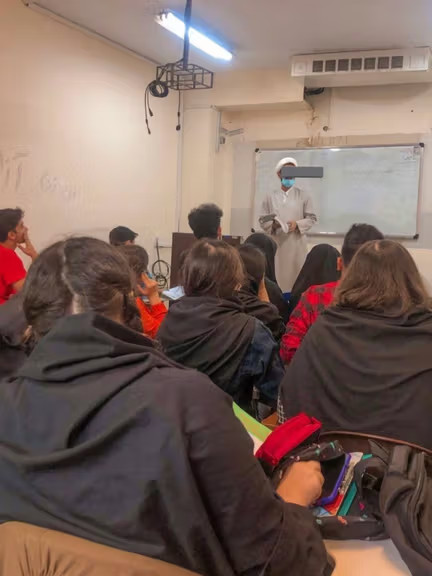
In addition to university students, many schoolchildren held rallies as they leave their schools, chanting slogans against the regime and its rulers.
In a joint call by the Youth of Tabriz, Zanjan, Esfahan, Mashhad, Ahvaz, Gorgan and Babol have urged people to pour into the streets on the anniversary of those killed in November 2019 on Tuesday. “We will start from high schools, universities and markets and continue with neighborhood-centered gatherings to move to main squares of cities,” read part of the statement.
A series of nationwide protests in Iran, sometimes known as Bloody November, took place in 2019. Initially triggered by a 50 to 200-percent increase in fuel prices, the demonstrations quickly turned into calls for the overthrow of the government and Supreme Leader Ali Khamenei. According to a report by a rights group, at least 3,000 protesters were killed by the Islamic Republic security forces from November 15 to 17, and nearly 20,000 arrested. Reuters at the time reported 1,500 deaths.
Since the current uprising began against Iran’s clerical regime almost two months ago, following the death of Mahsa Amini in police custody, numerous calls have been issued by groups, institutions, guilds, and associations for demonstrations, gatherings, and strikes.
Also on Sunday, Iran's judiciary charged more than 750 people in three provinces for participating in "recent riots." More than 2,000 people had already been charged, nearly half of them in the capital Tehran, since the demonstrations began in mid-September. They face accusations including "incitement to murder", "harming security forces", "propaganda against the regime" and "damaging public property", the judiciary's Mizan Online news website reported.
After a threat by hardliner lawmakers earlier in the month asking that protesters be sentenced to death, the Judiciary signaled its intention to do just that on November 8.
So far at least 326 protesters – including 43 minors-- have been killed and tens of thousands arrested, although the government has not issued any figures.
On Saturday, diaspora Iranians in Europe, North America and elsewhere held rallies to condemn the Islamic Republic for brutality against antigovernment protesters.
Coupled with the activism of the Iranian diaspora and the calls with rallies to mark the anniversary of Bloody November, the UN Human Rights Council is set to hold a special session the following week over the Islamic Republic heavy-handed clampdown.
In a phone conversation with UN Secretary General Antonio Guterres Thursday night, Iran’s Foreign Minister Hossein Amir-Abdollahian warned of the “negative consequences” of the UNHRC’s meeting.